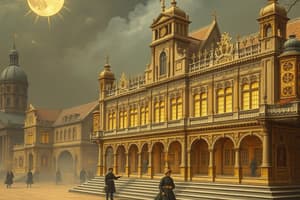Podcast
Questions and Answers
What is the primary focus of historical methodology?
What is the primary focus of historical methodology?
- Promoting a single narrative
- Collecting anecdotal evidence
- Use of primary and secondary sources (correct)
- Focusing solely on artifacts
Which period is characterized by the use of writing and the development of early civilizations?
Which period is characterized by the use of writing and the development of early civilizations?
- Middle Ages
- Classical Antiquity
- Prehistory
- Ancient History (correct)
What major theme in history examines class systems and family dynamics?
What major theme in history examines class systems and family dynamics?
- Social Structures (correct)
- Economics
- Culture
- Politics and Power
Who is recognized as the leader of Indian independence through nonviolent resistance?
Who is recognized as the leader of Indian independence through nonviolent resistance?
What was a key defining feature of the Renaissance and Reformation period?
What was a key defining feature of the Renaissance and Reformation period?
Which of the following best describes revisionist history?
Which of the following best describes revisionist history?
Which historical figure is known for initiating the Protestant Reformation?
Which historical figure is known for initiating the Protestant Reformation?
Why is the study of history important?
Why is the study of history important?
Flashcards are hidden until you start studying
Study Notes
Key Concepts in History
-
Definition of History
- Study of past events, societies, and civilizations.
- Involves analysis of documents, artifacts, and oral traditions.
-
Historical Methodology
- Use of primary and secondary sources.
- Critical analysis and interpretation of evidence.
- Contextual understanding of events.
-
Major Historical Periods
- Prehistory
- Time before written records; use of archaeology.
- Ancient History (circa 3,000 BCE - 500 CE)
- Development of writing, early civilizations (e.g., Mesopotamia, Egypt, Indus Valley).
- Classical Antiquity (circa 500 BCE - 500 CE)
- Rise of empires (e.g., Greece, Rome) and major philosophies.
- Middle Ages (circa 500 - 1500)
- Feudalism, the spread of Christianity and Islam, the Crusades.
- Renaissance and Reformation (circa 1400 - 1700)
- Cultural revival, scientific advancements, religious reformations.
- Modern History (circa 1700 - Present)
- Industrial Revolution, world wars, globalization.
- Prehistory
-
Key Themes in History
- Social Structures: Class systems, gender roles, family dynamics.
- Politics and Power: Governance, revolutions, imperialism.
- Economics: Trade systems, economic theories, resource distribution.
- Culture: Art, religion, language, and philosophy.
-
Notable Historical Figures
- Alexander the Great: Conqueror and spreader of Hellenistic culture.
- Julius Caesar: Key figure in the transition from Roman Republic to Empire.
- Mahatma Gandhi: Leader of Indian independence through nonviolent resistance.
- Martin Luther: Initiated the Protestant Reformation.
-
Historical Interpretation
- Different perspectives (e.g., Marxist, feminist, postcolonial).
- Revisionist history: Re-evaluating established narratives based on new evidence.
-
Importance of History
- Understanding human behavior and societal development.
- Learning from past mistakes to inform current and future decisions.
- Preservation of cultural identity and collective memory.
Resources for Further Study
- Textbooks and historical texts (e.g., "A People's History of the United States").
- Documentaries and films covering significant events.
- Online databases and archives for primary sources.
Definition of History
- Involves the study of past events, societies, and civilizations.
- Analyzes documents, artifacts, and oral traditions for insights.
Historical Methodology
- Relies on both primary and secondary sources for research.
- Emphasizes critical analysis and interpretation of evidence.
- Requires contextual understanding to interpret historical events accurately.
Major Historical Periods
- Prehistory: Era before written records, primarily studied through archaeology.
- Ancient History (circa 3,000 BCE - 500 CE): Marked by the development of writing and early civilizations like Mesopotamia, Egypt, and the Indus Valley.
- Classical Antiquity (circa 500 BCE - 500 CE): Notable for the rise of empires such as Greece and Rome along with the emergence of major philosophies.
- Middle Ages (circa 500 - 1500): Characterized by feudalism, the spread of Christianity and Islam, and the occurrence of the Crusades.
- Renaissance and Reformation (circa 1400 - 1700): A period of cultural revival, scientific advancements, and religious reformations.
- Modern History (circa 1700 - Present): Defined by the Industrial Revolution, two world wars, and the processes of globalization.
Key Themes in History
- Social Structures: Examines class systems, gender roles, and family dynamics across societies.
- Politics and Power: Focuses on governance, revolutions, and the impacts of imperialism.
- Economics: Investigates trade systems, economic theories, and resource distribution methods.
- Culture: Covers aspects of art, religion, language, and various philosophies.
Notable Historical Figures
- Alexander the Great: Known for conquering vast territories and spreading Hellenistic culture.
- Julius Caesar: Played a crucial role in transitioning Rome from a Republic to an Empire.
- Mahatma Gandhi: Led the Indian independence movement through principles of nonviolent resistance.
- Martin Luther: Played a significant role in initiating the Protestant Reformation.
Historical Interpretation
- Utilizes various perspectives, including Marxist, feminist, and postcolonial viewpoints.
- Involves revisionist history, which seeks to reevaluate existing narratives using new evidence.
Importance of History
- Facilitates understanding of human behavior and societal evolution.
- Offers lessons from past mistakes to guide current and future decision-making.
- Aids in the preservation of cultural identity and the collective memory of societies.
Resources for Further Study
- Textbooks and historical texts, such as "A People's History of the United States," provide foundational knowledge.
- Documentaries and films can offer visual insights into significant historical events.
- Online databases and archives serve as repositories for primary source materials for research.
Studying That Suits You
Use AI to generate personalized quizzes and flashcards to suit your learning preferences.




